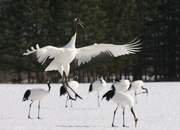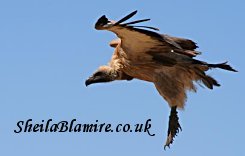
|
The addition of a
counter to this page revealed quite a few visitors to this part of the
Knutsford Ornithological Society website!
Initially (1995) it was an exercise in the production of .wav and .ra sound
files for inclusion on a website so others could download them to their own
computer. Encouraged by the number of visitors I'll perhaps try and add a few
other examples of the songs and calls of British birds in the months to
come.
species arranged in systematic
order.
Canada Goose.
Although not a native of Britain, firmly established and originally
chosen as the Society's emblem. A sound familiar to all residents of Knutsford,
birdwatchers or not, heard mostly in Winter as flocks move constantly between
the local Meres.
.wav
(171KB)
Buzzard. After
their dramatic decline in the 60's and 70's the species became very rare in the
area. The situation now appears to have been reversed and once again the call
of the Buzzard can be heard on a regular basis.
.wav
(150KB)
Ringed Plover.
Widespread on passage along the coast, less common inland, but often noted at
Neumann's Flash and Haydyn's Pool (Northwich). Nests at one or two locations in
the county.
.wav
(239KB)
Lapwing One of nature's most evocative sounds,
when first heard each year it's a sure sign that Spring is just around the
corner.
.wav
(295KB)
Curlew. Has
nested in good numbers locally, although fewer of late. Plenty in the hills and
here in Winter on the Dee estuary.
.wav
(313KB)
Whimbrel. Was
known as the Seven Whistler in some areas at one time. It's not difficult to
see why.
.wav
(308KB)
Green Sandpiper A relatively common Autumn
visitor, sometimes remaining throughout the Winter
.wav
(84KB)
Redshank. Both
Common and Spotted Redshank on this recording - first the chewit, chewit of the
Spotted followed by the more familiar calls of the Common Redshank.
.wav
(374KB)
Greenshank. Big,
bold and very noisy - best seen in the highlands of Scotland
.wav
(224KB).
Bar-tailed
Godwit. Seen during Spring passage at Mobberley SQ, we always get
such super views on the sandy beaches of Lindisfarne.
.wav
(318KB)
Black-tailed
Godwit. Now wintering in large numbers on Frodsham
Marshes.
.wav
(274KB)
Common Tern Seen
annually over the Cheshire meres during the Spring & Autumn
passage.
.wav
(341KB)
Little
TernPlenty around on the Dee estuary, they have been recorded from
both Tatton and Rostherne.
.wav
(237KB)
Sandwich Tern.
Recorded at Rostherne but not Tatton, very common on our August trip across to
Hilbre. "Carrick, Carrick the same as Altrincham's big center forward of
the 1970's which will make it a lot easier to remember won't it!
.wav
(233KB)
Stock
Dove. Often overlooked, nests in Tatton's Dog Wood and can be
heard from early Spring to late Summer
.wav
(372.kb)
Woodpigeon.
Abundant! with an abundantly boring "song".
.wav
(266KB)
Collared Dove.
First nested in the UK in the mid 50's and has since spread to Iceland and even
the USA - aren't you lucky at 4 am with one on your tv aerial!
.wav
(251KB)
Turtle Dove. A
long distant Summer migrant with a song like one of those 1970's trimphones!
Thousands are slaughtered every year by those
brave hunters from Malta
.wav
(302KB)
Cuckoo.. Unmistakable (or was until Collared
Doves arrived on the scene to confuse the hard of thinking) declining
rapidly
.wav
(257kb.)
Barn Owl. A
slowly recovering population thanks to various re-introduction schemes. At
least two nest sites now in Mobberley. Adult + young here.
.wav (194kb)............mp3 (145kb)
Little Owl. Now
perhaps the most frequently heard of the owl calls in the Knutsford
area.
.wav 209(kb)
............mp3(145kb)
Tawny Owl.
Active from November onwards, still plenty about. Here two males and a female +
plod.
.wav (248kb)............mp3 (183kb)
Swallow (now more correctly
- Barn Swallow). Nests under cover inside any suitable building,
especially farms with their abundance of insect life
.wav
(346.kb)
Dunnock or Hedge
Sparrow Get yourself familiar with this beautiful, simple little
song before the Summer migrants arrive to cause confusion.
.mp3 (160.kb)
Carrion Crow.
"A crow in a crowd is a rook, a rook on it's own is a crow"........
old Yorkshire saying used a lot by my Grandad, John William (Jack ) Sayer,
1892 - 1966 who first introduced me to Birdwatching.
.wav
(389KB)
Rook A pleasing,
less raucous call than that of the Carrion Crow.
.wav
(215KB)
Green Woodpecker. A Tatton speciality
with up to five pairs thought to be breeding - easy to see (or hear!) why it
used to be known as the "Yaffle"
.wav
(266kb)
Great & Lesser Spotted Woodpeckers.
Normally a case of - is it a Greater at a distance of a Lesserpecker close to?
The Greater is normally shorter and more resonant than the Lesser which is
delivered at a constant pitch.
.wav
(394kb.)
Robin Sings for
most of the year, this is it's rather wistful Autumn rendering. NB this is our
European Robin - not the American Robin !
.wav
(224KB)
Whinchat Used to breed throughout the Cheshire
Plain, now you have to travel to the Pennines to have any chance of catching up
with a singing male in the breeding season.
.wav
(330Kb.)
Blackbird. The
commonest of our resident Thrushes and perhaps the best songster amongst them -
who needs the Nightingale!
.wav
(195.kb)
Song Thrush.
More repetitive than the Mistle, heard from December onwards, peaking in
March/April.
.wav (385kb.)
Mistle Thrush.
The Stormcock...... early in the year, when the weather is broken, the bird
perches high on a tall tree and in exultant and ringing song defies the elements.......
T.A.C.
.wav
(210kb.)
Grasshopper Warbler.
The "gropper" breeds in thick overgrown vegetation,
normally close to water. Listen carefully it's easily missed.
.wav
(241.kb)
Reed Warbler. The bird of Knutsford Moor - breeds in good
numbers and it's arrival is eagerly awaited each Spring, compare it's song with
the one below
.wav
(146KB)
Sedge Warbler.
Also breeds annually but in smaller numbers - the songs of this and the
preceding species are often confused by beginners.
.wav
(213KB)
Garden Warbler. More sustained and with less
variation than the Blackcap. Common but often overlooked, fond of
Sallow
.wav
(277.kb)
Blackcap. Very
common all across our area, has a strong affinity for the rhododendrons in
Tatton. Song easily confused with that of the Garden Warbler
.wav
(333.kb)
Common Whitethroat.
Delightful little songster, not very tuneful but makes up for that
by sheer exuberance. (Lesser Whitethroat in the background)
.wav
(339.kb) ............. .ra
(34kb)
Lesser
Whitethroat. The birdwatchers's bird. learn the song and you'll
be surprised just how many there are nesting round the lanes of
Cheshire.
.wav
(315kb.)
Willow Warbler.
The most widespread of our summer warblers - has hit the skids since 2000
.
.wav
(321.kb)
Chiffchaff. One
of the first Summer migrants to return, sometimes as early as the Sand
Martin.
.wav
(244kb)
Wood Warbler.
Mainly heard on passage but has bred in Tatton. Alderley Woods is
it's local stronghold. Song likened to a sixpence spinning on a dinner
plate.
.wav
(297.kb)
Only ever heard once
(Listeners from outside Europe may need
an
explanation!)
.wav (705kb)
Eric Hardy on Radio Merseyside from 1977
MP3 only
(1.2Mb.)
Back to Knutsford Ornithological
Society Homepage
|
| |
 Join Roy Adams in Hungary - Brilliant!
Join Roy Adams in Hungary - Brilliant!
|
|

|
Dave Pullan - Extensive guiding
experience on 6 Continents, from the arctic to the equator to Antarctica,
|
|
 |
|
 |
|